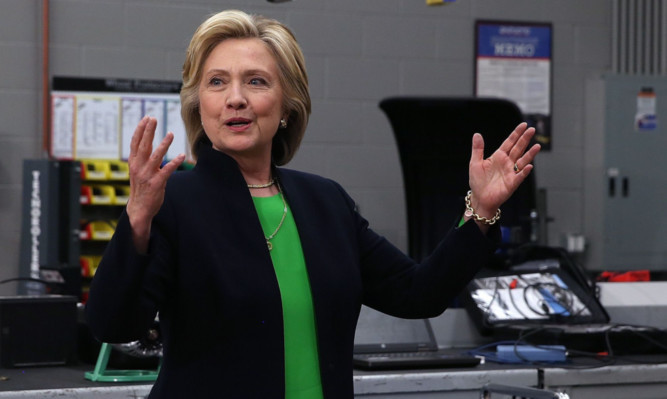On Sunday the worst-kept secret in America was revealed to the world as Hillary Clinton launched her second bid to become president of the United States of America.
If she wins the Democratic nomination, it will be the first time either of the two major US political parties has had a female presidential candidate. It’s a much belated chink of sunlight in the colossus that is American politics.
A single video edited to near death by months of focus group testing single-handedly overshadowed the UK general election campaign over the weekend and into Monday.
You can bet your bottom dollar Ed Miliband and David Cameron wish they had even a tenth of the star power needed to create a total eclipse of the world’s media even for an hour.
In the video, Hillary Clinton said: “Everyday Americans need a champion, and I want to be that champion.”
She added in her pitch directly to middle class voters that “the deck is still stacked in favour of those at the top of the economy”.
It’s a bit of a bold statement given Clinton and her husband are themselves at the top of the wealth pool.
When she left the US State Department in 2013, her financial disclosure report showed that her combined net worth with her husband was between $5.2 and $25.5 million.
And then there are the millions earned from her memoirs to be added to that sum.
While campaigning in Iowa on Monday, Hillary Clinton called for getting unaccountable money out of politics “once and for all, even if it takes a constitutional amendment”.
Apparently fixing America’s political system, and counteracting the influence of money in it, would be one of the four big fights of her campaign.
But is she a hypocrite given her wealthy family dynasty and the eye watering sums her campaign is set to spend?
The combined Clinton operation, including her campaign and outside groups supporting her, is reported in the New York Times to be a $2.5 billion effort. That’s a significant increase from the last presidential race where Barack Obama spent $1.123bn.
And of course, none of these figures included the spending of the super PACs, which can take unlimited sums from individuals, companies and unions and spend the money boosting specific candidates. They have become a major part of campaign fundraising since they first emerged in the wake of the Supreme Court’s decision in Citizens United v. the FEC.
Super PACs allow extremely wealthy activists to play a part in presidential and congressional politics like never before, funding things like splashy TV campaign adverts.
But don’t let Mrs Clinton’s comments make you think that she is renouncing big-dollar fundraising.
She will rely on it, along with grassroots fundraising which Barack Obama pioneered in his race against her “dialling for dollars” as they call it Stateside.
Florida Governor Jeb Bush, widely tipped as the Republican candidate, is this week doing a fundraising swing through Texas with family in tow.
Both former Bush presidents will reportedly attend fundraising events in Jeb Bush’s home state, with an evening reception at the home of wealthy Dallas banker Gerald Ford reportedly asking attendees to contribute $100,000 per couple for the event.
All of this points to the reality of American politics: it’s a family affair where family dynasties, whether Kennedy, Clinton or Bush, inherit major fundraising kudos and support networks which give the elite a big advantage in the race for the most powerful position in the world.
Not exactly a good backdrop to becoming the leader of the free world.
Hillary Clinton and her husband’s history of big-buck fundraising from rich donors leave many sceptical of her commitment to campaign finance reform.
However, she is competing in an existing system of lax campaign finance laws.
So I would file her efforts to change the campaign finance system under “don’t hate the player, hate the game”.
At least she is trying to do something about it.
And she isn’t delaying her campaign launch for months so she can keep personally raising huge donations for a Super PAC, like Jeb Bush is. Once you declare your candidacy, you can only ask for a few thousand dollars per donor although donors can still give Super PACs unlimited amounts on their own.
While it is far from perfect, things on this side of the Atlantic don’t seem quite so bad.
For example, just looking across the SNP candidates, you can elect a nurse like Emma Harper standing for the SNP in Dumfriesshire, Clydesdale & Tweeddale; a former teacher and active crofter like Angus Brendan MacNeil standing for Na h-Eileanan; or a small business owner like Tommy Sheppard who runs the successful Stand Comedy Club.
Whereas in the US you can elect the rich and/or the famous who know the rich. Those seem to be the choices. Money and connections talk.
I’d like to see Hillary succeed in her bid to become the first female president of America. I just hope it will be her ideas and not her bank account that wins it for her.
